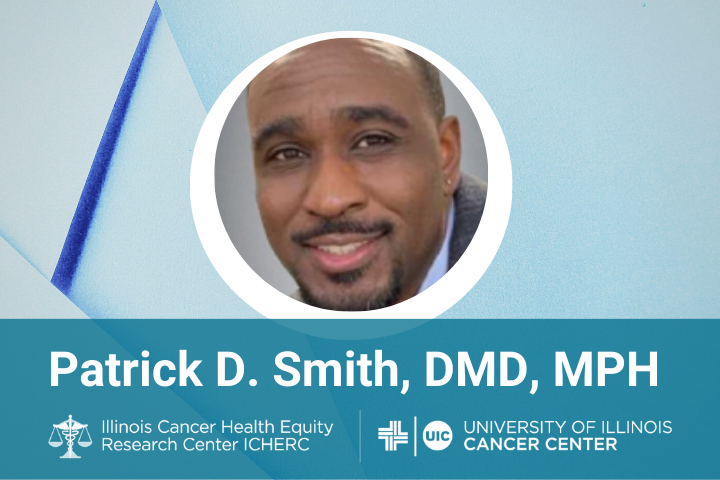
Because too many Black men are dying for a lack of information about head and neck cancer prevention and treatment, University of Illinois Cancer Center member Patrick D. Smith, DMD, MPH, is leading a research project to develop an engagement tool that will help dental providers initiate discussions with Black men about oral cancers and pharyngeal cancers.
Black men are at the highest risk of dying from oral cancer compared with other men, and there is growing evidence that poor oral health increases the risk of oral cancer. Oral cancer in Chicago is a racial health disparity issue because there are south and west communities with higher rates of incidence than other communities. April is Head and Neck Cancers Awareness Month.
“Dental providers can’t be insecure or misinformed about how to talk to Black men about oral health in a way that is motivational and more conducive to relationship building and shared decision-making,” said Smith, the project’s Principal Investigator and an Assistant Professor in the University of Illinois Chicago (UIC) College of Dentistry.
Funding for the Project
Smith will collaborate on this oral cancer research project with Project Brotherhood, a community-based organization with expertise in Black men’s health, in the project funded by a Research Scholar Grant from the Illinois Cancer Health Equity Research (I-CHER) Center.
The I-CHER Center is part of Cancer Center and made possible with funding from both the American Cancer Society (ACS) and support from the Cancer Center. UIC was 1 of 4 Minority Serving Institutions the ACS awarded four-year, $4 million grants to establish Cancer Health Equity Research Centers. The other three schools were the University of Arizona, Morehouse School of Medicine, and Howard University. The I-CHER Center supports targeted projects designed to strengthen interdisciplinary science and create solutions to address the unmet needs of patients.
Building Partnerships for Oral Cancer Research
Now in the project’s second year, Smith said the group is convening stakeholders with varying areas of expertise in cancer prevention, clinical practice, and community engagement who meet once per month to discuss and brainstorm ideas for building out the engagement tool. Once it’s built out, the plan is to test it with about 50 men.
“We’re actively building partnerships with clinical entities to help test the tool once we get to that point in the next couple of years, so hopefully some of those partners will become early adopters,” Smith said.
Success for Smith is to have a published engagement tool available for use by dental providers and for other researchers to scrutinize and improve.
“It’ll be something that perhaps clinicians will embrace in their efforts to prevent oral cancer among Black men. Also, we hope that it’ll add value to the dental care experiences of Black men and serve as a guide for patient-doctor relationship building, for not just oral cancer but other oral health concerns,” Smith said.
